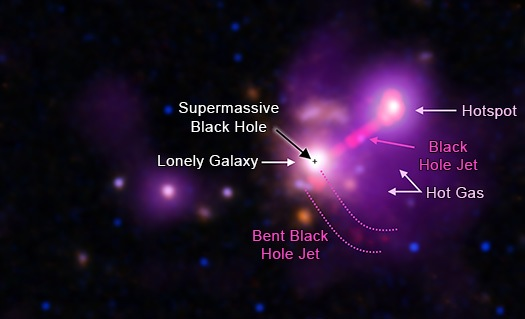Astronomers have discovered a cannibalistic galaxy with a voracious appetite

It would have absorbed all the other galaxies that were around.
Located about 9.2 billion light-years from Earth, the galaxy 3C 297 lives in complete solitude, a situation that wouldn't always have been like this. Astronomers who have studied it are convinced that it was once part of a cluster of galaxies, but that they would have been assimilated under the effect of its powerful gravitational force.
A lonely galaxy
The team of scientists explains that they have discovered significant quantities of gas with extreme temperatures of more than a million degrees, which is generally observed with a cluster of galaxies. They also noticed the presence of a supermassive black hole which swallows everything in its path and which has also emitted a large jet of plasma over 140,000 light years.
" It looks like we have a cluster of galaxies that is missing almost all of its galaxies ," said Valentina Missaglia, a researcher at the University of Turin, " we expected to see at least a dozen galaxies the size of the Way Milky Way, but we only see one ".
The image below, captured by the Gemini Observatory, suggests that several galaxies still lie around 3C 297, but they are actually very far away. " We think the gravitational pull of the single large galaxy combined with the interactions between the galaxies was too strong, and they merged with the large galaxy. For these galaxies, apparently, resistance was futile ,” said Juan Madrid of the University of Texas, co-author of this study.

Researchers now consider 3C 297 to have become a fossil group, that is, it combines the remains of several galaxies, a stage that has never been observed for such an ancient galaxy which formed 4 6 billion years after the big bang, " it doesn't shatter our ideas about cosmology, but it does start to push the boundaries of how quickly galaxies and galaxy clusters must have formed ," Mischa says. Schirmer of the Max Planck Institute.
Source : websites

